INVESTIGATION… COVID-19: How Nigeria aids spread through mishandling of laboratory tests
In the last week of May, Mrs Dorothy Samuel (not real names), a former top banker and now a major branding specialist for several corporate organisations in the country, employed a domestic staff to take care of her home. She, however, insisted on having the new staff tested for COVID-19 before she could resume in her house.
Not leaving anything to chance, Mrs Samuel entrusted the coordination of the test to one of her trusted staff, simply identified as Ben, to be sure that the test is actually carried out. This, Ben did, while also subjecting himself to the same test at the African Church Primary School, Bale bus stop, off Akowonjo, Egbeda, Lagos, in a bid to assure the yet-to-resume maid that the test wasn’t discriminatory and nothing to worry about.
The African Church Primary School test centre is one of the 17 locations the Lagos State Government designated and published for conducting COVID-19 test. Residents of the State were at liberty to walk in and get tested at no fee.
What the organizers, however, failed to tell residents of the State was that getting tested did not guarantee that you would know your status during the initial 72 hours as Nigerians were told at the onset of the global pandemic in the country.
Though Ben and the domestic staff were told to expect their results within a week through either text messages or emails, one week turned into weeks and ultimately a month and a week, before that of Ben eventually came via a text message saying “your test result for COVID-19 is negative”.
For the domestic staff, her result came another one week later, making it a waiting period of one month, two weeks!
Ripples Nigeria, in a bid to understand the workings of the test centres and validate complaints by Nigerians that the Nigeria Centre for Disease Control (NCDC) may not have applied itself diligently to the task of prompt testing, visited test centres in Lagos for an on the spot assessment.
The findings in this undercover investigation suggests that NCDC and the Nigerian government mayb more complicit in the much feared community spread of the COVID-19 pandemic currently ravaging the country.
Test Centres – Abandoned, Uncordinated
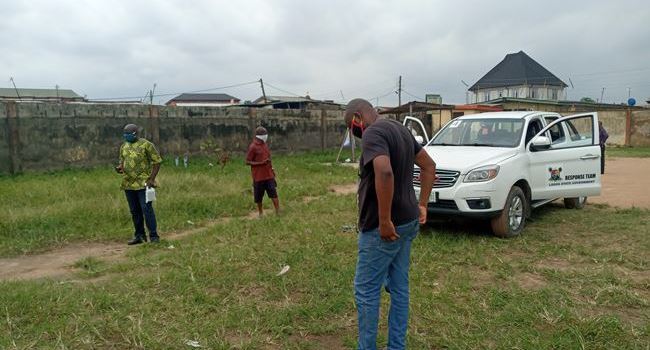
Akowonjo COVID-19 Test Centre: Open field without shelter from rain or sun for those who came for test
The test centres visited by Ripples Nigeria namely Akowonjo, Ifako, Ogudu and Ikorodu, presented different pictures of abandonment, lack of co-ordination and unfriendly attitudes by health workers saddled with the responsibility of carrying out the test.
At the African Church Primary School test centre in Akowonjo, where Ben and the domestic staff carried out their test, it was a case of both despair and unfriendly attitude by the health workers.
The woman saddled with the responsibility of clerking (a term the health workers use for taking down details of those to be tested) could not be bothered to come down from the Hilux van with the Lagos State logo, as she sat down inside the vehicle and had those she want to clerk shout out their details to her from a distance, apparently to maintain social distancing. Any attempt at moving closer received a strong reprimand from her.
The woman was for the most part outrightly hostile to people, especially on the two occasions Ripples Nigeria visited the centre
However, a doctor at the centre, one Dr. Melford, appeared both overwhelmed and helpless, as he attended to several complaints from people who had come to make inquiries about their test results.
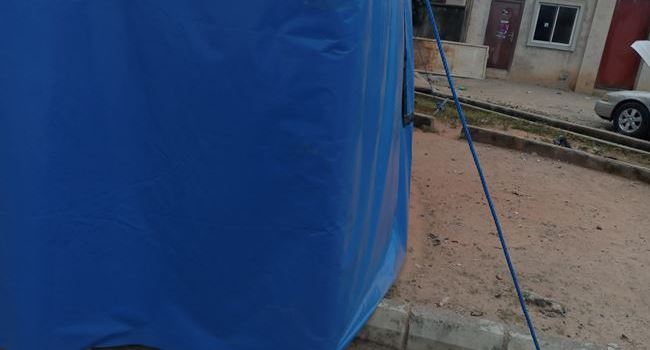
Abandoned Ifako Test Centre located within Ifako Mini Stadium in Ogba
While responding to enquiries from Ripples Nigeria, Melford said: “I am tired of these complaints; people keep saying they have not gotten their results weeks after taking the test. But there is really nothing I can do about it because my own job is to ensure that tests are carried out and delivered to the labs for analysis. All I can do now is to take down the names and forward them again for confirmation.”
On the whole, the Akowonjo test centre cuts the picture of an uncoordinated centre where Nigerians daily struggle under the scorching sun, and sometimes rain, to get tested, as there are no provisions for chairs or canopies to ease the pains they go through during the long waiting period.
If Akowonjo test centre was uncoordinated, the Ifako test centre, located at the Ifaki Mini Stadium, off College Road, Ogba, cuts a different picture entirely, as the centre had long been abandoned.
When Ripples Nigeria visited the centre on July 2nd, 2020, the centre was deserted, except for some men who were seen playing draft at the security post of the stadium.
According to one of the men, who did not give his name published, the health workers attached to the centre stopped coming for more than a month before Ripples Nigeria visited.
“We have not seen them for more than a month here. They said they don’t have materials to work with, so they stopped coming”, he said.
Asked if he had an inkling when the centre will resume, the middle-aged man said he could not say since he does not work with government.
Ogudu Test Centre —A ray of hope
The Ogudu test centre located at the annex of the Kosofe Local Government Area office presented a ray of hope amongst the centres Ripples Nigeria visited, both in terms of organisation and the commitment of the health workers in charge.
When on July 2nd, 2020 this reporter walked into the centre and presented himself for test, the doctor in charge, Dr Charles lamented that they were almost rounding up for the day and that the reporter did not book for an appointment with the NCDC ahead.
According to him, it is the NCDC that directs those who meet the criteria for testing to book an appointment with them for the exercise.
This is, however, contrary to what the NCDC and the Presidential Task Force on COVID-19 had always told the public, as both bodies continue to encourage Nigerians to go for the test.
Ripples Nigeria had reported how the National Coordinator of the PTF on COVID-19, Dr. Sani Aliyu had raised the alarm in the month of July over low turnout for testing by citizens, saying the country’s testing capacity was underutilised.
Aliyu said that despite the availability of laboratories across the country, the sample collection for testing still remained low.
“We have more than 30 laboratories across the country, but we are confronted with low demand. Our capacity as a nation exceeds what we are getting in term of samples. Moving forward, we are going to ensure that every government-owned hospitals across the country is empowered to collect samples.
“COVID-19 is not a death sentence; people recover from it and move on with their lives. We hereby urge people to present for testing so that they can protect themselves and loved ones,” he said.
At the Ogudu centre, Akowonjo centre, one of the two Ikorodu centres located inside Igbogbo-Bayeku LCDA secretariat, scores of those who came for testing were turned back because they had no prior appointment with the NCDC.
Ripples Nigeria reporter was, however, lucky as Dr. Charles graciously agreed to have him tested as the last person for the day.
Test done, the female health worker who took the samples said result would be ready between a week or two.
The waiting game
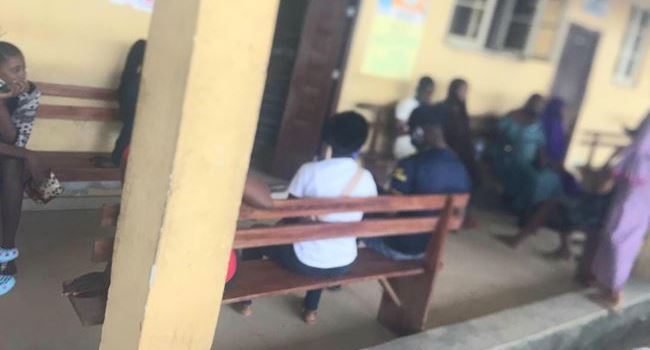
Picture of Ikorodu Test Centre
For this reporter, waiting for the result of COVID-19 test was psychologically traumatizing, especially when one considered age and other health conditions, and bouts of malaria in between the waiting period.
Every cough and or cold raised suspicion that he was COVID-19 positive. This also came with nasty dreams that tended to raise the level of anxiety. It can only be likened to waiting for an HIV test result for a young man who knows he had not been particularly circumspect.
From interactions with many others who took the COVID-19 test and had their results delayed, this reporter’s experience had been the case with many Nigerians. The fear and anxiety attached to not knowing your COVID-19 status one month after taking the test can be very traumatic.
For this reporter, the result of the test taken on 2nd July did not come as at 11th of August, when he had to pay a return visit to the Ogudu test centre, and again, Dr. Charles was on hand to handle the situation.
Shocked that no text message, email or call had been recieved for over a month, the doctor decided to check the data base only to pronounce the reporter negative.
It is, however, disturbing that up till the time of publishing this report, no official confirmation had come from the NCDC as to the true status of this reporter.
Prioritising testing on social status?
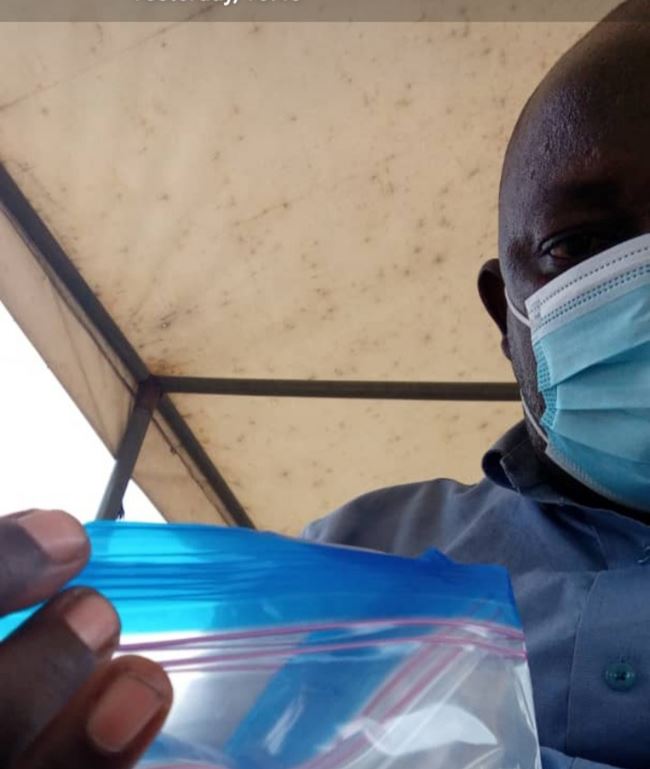
Ripples Nigeria Reporter taking COVID-19 Test under Cover
From the experience of ordinary Nigerians, there appears to be an unwritten code that places citizens at the lower rung of the social ladder at a disadvantage in the testing and release of results.
While ordinary Nigerians like Ben, the domestic staff, this reporter and many others have to wait for more than a month before getting their results, top placed Nigerians, including governors and politicians, know their status within days of taking the test.
This is despite the persistent call for testing by the NCDC and the PTF, who claim the country has excess capacity for testing.
The field reports in Lagos seem to confirm fears that the government places more premium on the health and survival of the privileged few above that of others, who have to endure a lot of hassles to get their samples taken and then wait for weeks before their status are determined.
Taking COVID-19 test beyond the reach of the Poor
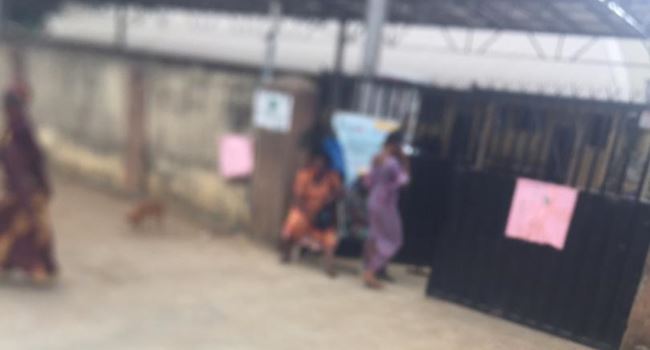
Picture of Ikorodu Test Centre
Closely related to this is the commercialisation of the COVID-19 testing by the Lagos State Government with the licensing of seven laboratories that charge between N45,000 and N55,000 for a test.
The accredited private laboratories are Total Medical Services, Synlab, 54gene, and Medbury Medical Services. Others are, Biologix Medical Services, 02 Medical Services, and Clina Lancet.
To make matters worse, the laboratories further charge what they call logistics, home service and mobilisation, which range between N10,000 and N50,000, a move which effectively takes timely testing out of the reach of poor Nigerians.
A resident of Lagos, Richards, who had to take the test with a time frame for the result, told Ripples Nigeria that the private laboratories are taking advantage of the lapses noticable with government test centres.
According to him, after taking a test at a government test centre without the result coming out on time, he was forced to approach one of the accredited private laboratories in Victoria Island for the test.
“Though I got my result in three days, I had to pay extra N30,000 as fee for some other things after paying the standard N50,400 they normally charge. For me, this is mere exploitation as I see no reason why the laboratory would charge me for logistics and mobilisation. Whatever that means”, he said.
How delayed test results aid community spread
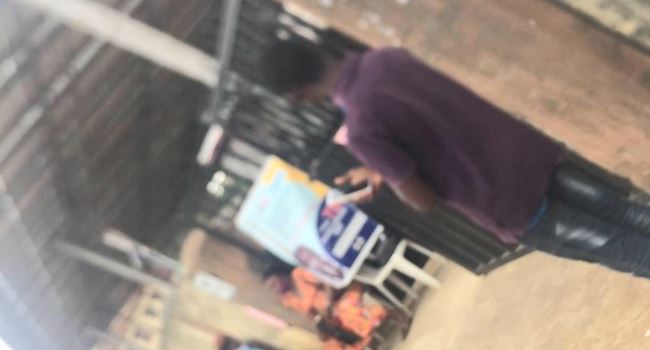
Picture of Ikorodu Test Centre
Many Nigerians seeking voluntary test for COVID-19 have personal reasons for doing so, and much of these border on reasonable suspicion that they might have been exposed to the virus.
The procedure that allows at least a week before appointment for test would be sanctioned by the NCDC has put a lot of strain on the system, especially for poor folks.
Ripples Nigeria findings suggest that it takes about a month, on the average, to get the results across to anxious applicants.
Sadly, while this happens, Nigerians with reasonable suspicions about their health status continue their normal lives, mingling with others who may contract the virus through them.
The delayed results have heightened concerns over reliability and credibility of the data shared by NCDC on regular basis. In other words, the data shared for a particular date could, indeed, be relevant stats for a week or two weeks prior.
For all practical purpose, the fact that data are generated many weeks in arrears clearly shows that Nigeria may be dealing with the wrong incidence rates, as it is chasing after the pandemic and not being on top of it.
Worse still, the erroneous scenarios paint a worrisome likelihood of rising community spread outside the figures captured by NCDC.
Attempts to get an official reaction from the NCDC did not yield a positive outcome at the time a decision was taken to publish this report. Neither calls nor messages sent to the known telephone line of Chukwuemeka Oguanuo, Personal Assistant to Director-General of NCDC, were answered.



